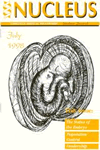We are told that Nabal was descended from Caleb,[1] although no inherited predisposition to illnesses is noted. His pre-morbid state gives some clues. However we do know that he was 'surly and mean in his dealings' (vv2,3) and prone to angry outbursts (vv10-11,14), as well as being fond of banquets and heavy alcohol consumption (v36).
In essence we have a typical 'type A personality', coupled with probable obesity and hyperlipidaemia (over-eating and drinking binges). Nabal appears to have three strong risk factors for atheromatous vascular disease, but which organ was primarily affected?
Preuss's book on Talmudic medicine[2] postulates that Nabal had a stroke which rendered him in a state of spastic paralysis 'like a stone'. The New English Bible translation of vv 37-38, 'he had a seizure', seems to confirm a cerebrovascular accident (CVA) as the cause of death, with a second episode perhaps accounting for his demise ten days later.
However, the NIV rendering 'his heart failed him' is more suggestive of a cardiac aetiology. The word 'heart' is used in the Bible to refer to both 'the seat of the emotions'[3] and the anatomical organ.[4]
We might therefore surmise that Nabal suffered a myocardial infarction upon hearing the anxiety provoking news of his escape from David's wrath. Strong emotion is a well known precipitant of unstable angina or heart attack. He then went into cardiogenic shock and became peripherally shut down, cold and clammy, 'like a stone'.
What then could account for his death ten days later? Fatal arrhythmia, ventricular septal defect (VSD) or mitral valve papillary muscle rupture are all sequelae of an acute myocardial infarction but usually occur earlier than ten days. Dr Luke therefore suggests that the cause of death was an acute myocardial infarction complicated by ventricular aneurysm that subsequently ruptured leading to cardiac tamponade and death.
Differential Diagnosis 26
In his investigation of the life of Jesus, Dr Luke recorded an occasion when he healed a crippled woman on the Sabbath (Luke 13:10-17). From the details given can you suggest a diagnosis?
Answers in the next issue
































